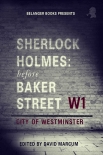Sherlock Holmes: Before Baker Street, David Marcum [reading books for 4 year olds .txt] 📗

- Author: David Marcum
Book online «Sherlock Holmes: Before Baker Street, David Marcum [reading books for 4 year olds .txt] 📗». Author David Marcum
“‘But just a few weeks ago, we had a man that came down to work on some of the gas jets, and he happened to notice the canvas painting lying out on one of the desks in the library. I confess that I’ve often studied it and the riddle over the years, trying to get behind Richard’s thinking, and more so recently, since my father’s health has started to fail. I’d dearly love to find the dagger and restore it to his hands before he passes. He hasn’t been well, you see.’
“‘And this man saw the painting, and remembered where he had seen one very much like it.’
“‘Exactly. He mentioned it to the cook while taking some refreshment in the kitchen, she told the butler, and he told me. I questioned the workman, and he said that the other painting was here, just a stone’s throw from the British Museum. I quickly decided to come up to London and see it for myself. I’ve stayed longer than I initially intended, hoping each day to find a clue to the dagger’s location. But I have no idea where the setting in the painting downstairs is located, and there is no more to be learned from the man, the horse, the boy, or the cows in that painting than there is in this one.’
“I confess, Watson, that up to that time, I hadn’t paid much attention to the painting in the parlour. It isn’t very attractive, as you’ll agree, and in general, my time in that room was generally spent in deep thought when I could no longer stand to be in my top-floor chambers. I felt that further study was required, and also a second opinion was needed. I sent word – ”
“ – to Sir Clive,” I interrupted.
He nodded. “Just Clive Bartleby then. A relatively new acquaintance that I’d made at the Museum while carrying out my diverse studies. Even then, he was making a name for himself. I sent a message around to his office, asking him to step over if convenient.”
“And not if inconvenient, come all the same?” I asked with a smile, recalling my friend’s message from the day before.
“It was implied,” Holmes responded. “Cavenham and I were in the parlour, looking at the painting, when Clive bustled in. After introductions were made, under the baleful glare of my landlady, we explained in hushed tones – for there were several other boarders enjoying the cool October breeze coming in from the tall open windows – about the two paintings, the message, and the long-lost dagger. Clive unrolled the painting, held it wide between his outstretched arms, and compared it from different angles to the larger version above the mantel.
“He nodded and muttered for some time, and he was clearly onto something. I knew better than to interrupt, but Edward Cavenham was becoming increasingly impatient. Luckily, at the moment Edward was about the burst, Clive was ready to speak to us.
“‘Clearly, it’s by Ward,’ he said, lowering his arms. “Funny that it’s been so close, and no one has bothered to identify it before now.’
“‘What?’ asked my client. ‘Who?’
“Clive went on to relate what he explained earlier this morning, as to how James Ward had been commissioned by the Duke of Bedford to create a number of paintings in the early 1800’s. ‘Obviously, he was hired to create one here as well, although there’s no telling why in this particular house without further research. The Bedford Estate has owned this property since the mid-1600’s, long before the houses were built. No doubt, the Duke simply wanted to provide a painting for whomever lived here then, or to give Ward another job, or both.’
“‘Perhaps the Duke of Bedford was friends with Richard,’ said Edward Cavenham, almost hopefully. ‘Possibly that’s why Richard and Lisette came here to stay before going on to France. They may have intended to stay here permanently.’
“‘You forget your own evidence,’ I pointed out. ‘The letters indicate that this was simply a stopping point along the way. Lisette apparently gave no indication that they knew anyone at this location, or that there was anything special about it.’
“‘But the painting!’ he cried, pointing at the wall. ‘You can’t deny that connection between this painting in this house, and the painting sent to my great-grandfather Lloyd.’
“I turned to Clive with a little idea that had been in the back of my mind. ‘Is it possible that the dagger is concealed behind the painting?’
“He shook his head. ‘Oh, I shouldn’t think so. This one is painted directly onto the plaster. I can’t imagine that destroying a work of art would have been an acceptable price to pay in order to retrieve the dagger. After all, according to what you’ve told me is recorded in the letters, Richard Cavenham struck up an acquaintance of sorts with Ward while they were here, getting him to paint the second picture that was sent to his father after this one was finished. I don’t believe that Ward would have been party to anything that might lead to the future destruction of his work, should someone have to remove the plaster to get at the dagger.’
“Edward looked at the painting on the wall. ‘I know that my painting is of our family estate. Where is the setting shown in that painting? Could the house beyond the trees be the location





Comments (0)